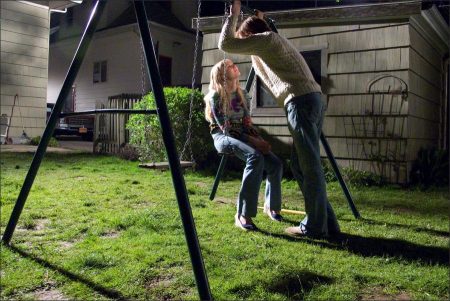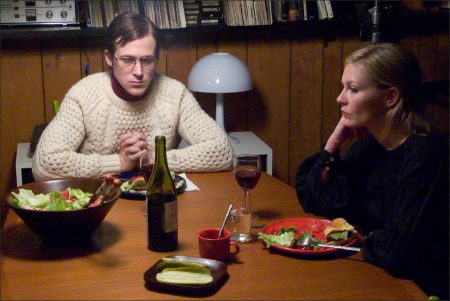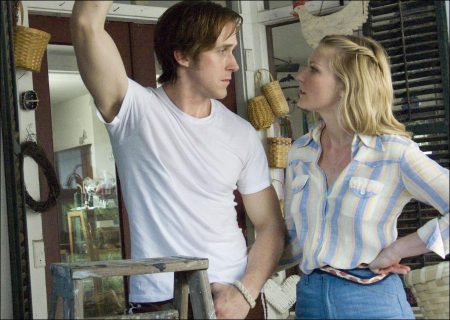There are various bad things in “All Good Things,” principally a dictatorial father, a submissive son and the tragic fates of the two unfortunate women who married them. These bad things are part of a strange case named David Marks, a fictional character based on Robert A. Durst, the true-life son of a New York real estate developer, Seymour Durst.
Among the weirder bad things: in 1982 the younger Mr. Durst’s wife, Kathie, disappeared. In 2000 his friend Susan Berman was murdered. (Both cases remain open.) A year later, while living as a mute woman in Texas, he killed (and chopped up) a neighbor in self-defense. Well, the jury called it self-defense before sending him to jail. The film takes a somewhat different view.
The director Andrew Jarecki, best known for his documentary “Capturing the Friedmans,” about a Long Island family implicated in a child sexual-abuse scandal in the 1980s, has a thing for very bad things or at least unhappy relations. Certainly the fictionalized brood in “All Good Things” is equal to the Friedmans in terms of dysfunction, and they’re loaded.
You get a sense of just how much money they have in the opening-credit sequence, with its artfully antiqued (faked) home-movie footage of children frolicking in summer whites on a lawn as great as that in Central Park. It’s a pretty picture or would be if the ominous music and camera position didn’t seem directed at the man portentously lurking in the background.
The lurker turns out to be Sanford Marks (Frank Langella), the domineering patriarch based on Seymour Durst, who serves as the villain. (All the names have been changed.) It’s a role that Mr. Langella fits easily, with a body that looms in the frame and an insinuating voice — every pause seems to hide a threat — which seeps into your nervous system.
His recessive, physically slighter son, David (Ryan Gosling), hardly seems a worthy heir. Not that David appears especially interested in following in the footsteps of a father who walks all over everyone in sight. It’s no wonder that David grabs onto Katie (Kirsten Dunst), a lovely young woman who shyly takes an interest in him, and heads off into the country.
Written by Marc Smerling and Marcus Hinchey, the film itself takes off in the early 1970s when David and Katie move to Vermont, where they open a health-food store called All Good Things. Their idyll is cut short when Big Daddy comes calling and, after threatening to cut off their money, bullies David into returning to New York to join the family business.
It’s initially puzzling why David, who seems so normal he’s borderline bland, gives in. David chafes at his father’s demands (which include collecting money from sleazy tenants), but Mr. Jarecki doesn’t rush to explain the character. Instead, he reveals David gradually through the dark looks, flashes of anger and sinister mutterings that herald the eventual conflagrations.
Through the good times and very bad the two leads are a comfortable, persuasive match. The appealing Ms. Dunst can make you see the melancholy in her smiles, and this works beautifully for a character whose love grows clouded with worry and then fear. Even after David brutally betrays Katie, Ms. Dunst lets you see what keeps her tethered to him when she knows she should leave.
And because Ms. Dunst continues to show you that love when all the air and happiness have been sucked out of the couple’s relationship, she helps keep David recognizably human. For his part, Mr. Gosling creates a character who’s charming and a touch creepy at the beginning, and increasingly charmless and creepy through to the end.
All About All Good Things movie.
All Good Things (2010)
Directed by: Andrew Jarecki
Starring: Ryan Gosling, Kirsten Dunst, Frank Langella, Lily Rabe, Philip Baker Hall, Kristen Wiig, Liz Stauber, Marion McCorry, Maggie Kiley, Marion McCorry, Trini Alvarado, Ashlie Atkinson
Screenplay by: Marcus Hinchey, Marc Smerling
Production Design by: Wynn Thomas
Cinematography by: Michael Seresin
Film Editing by: David Rosenbloom, Shelby Siegel
Costume Design by: Michael Clancy
Set Decoration by: Rich Devine
Art Direction by: Russell Barnes
Music by: Rob Simonsen
MPAA Rating: R for drug use, violence, language and some sexuality.
Distributed by: The Weinstein Company
Release Date: December 3, 2010
Views: 430







